Invented at Duke 2023 showcases a bustling innovation ecosystem

On a cold, windy last Tuesday in November, around 300 people from the Duke community and entrepreneurial colleagues from across the Triangle came together to celebrate Duke inventors and innovations at the 5th Annual Invented at Duke event.
Faculty, staff, students, local investors and entrepreneurs, and many more enjoyed food and drink as they networked with each other and explored booths of featured inventors. Attendees guided chest tubes with novel medical devices, remixed footage with an interactive online platform, learned about metamaterial computer chips, and more as featured inventors from across Duke schools showed off their technologies.
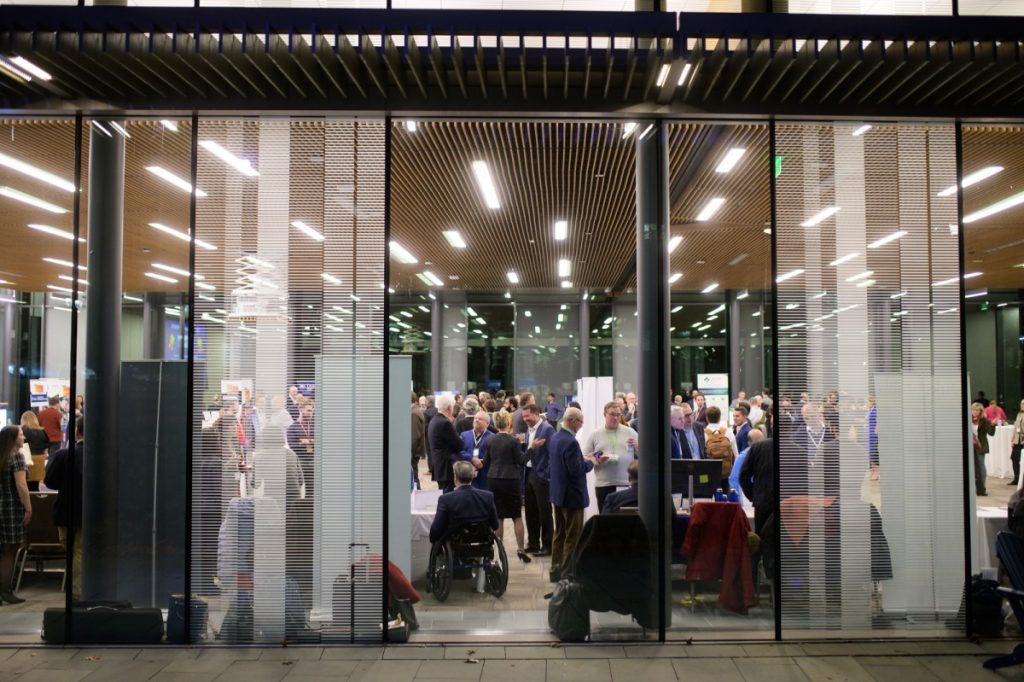
The nine featured inventor booths, listed in more detail below, were not only varied in their departments, but in their technology and career stages. Full professors pitched their technologies alongside graduate students; more established startups rubbed shoulders with nascent prototypes.
What all these featured inventors had in common was plentiful interaction with Duke’s Office for Translation & Commercialization, which helped not only protect their technologies’ intellectual property but also connect the inventor teams with more resources and mentorship, internal to and external to the university.
This growing capacity to provide longitudinal support for innovators at Duke – especially through the new Gilhuly Accelerator Fund – was highlighted by speakers, including Associate VP for Translation & Commercialization Robin Rasor, Duke University President Vincent Price, and Jungsang Kim, the Schiciano Family Distinguished Professor of Electrical and Computer Engineering and co-founder of quantum computing start-up IonQ.
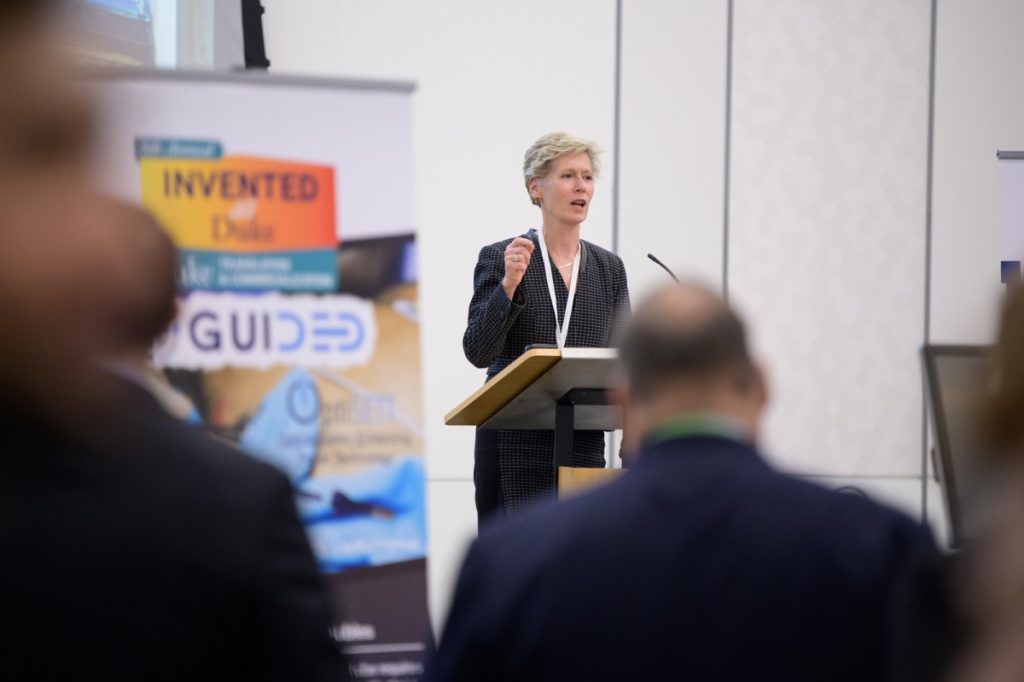
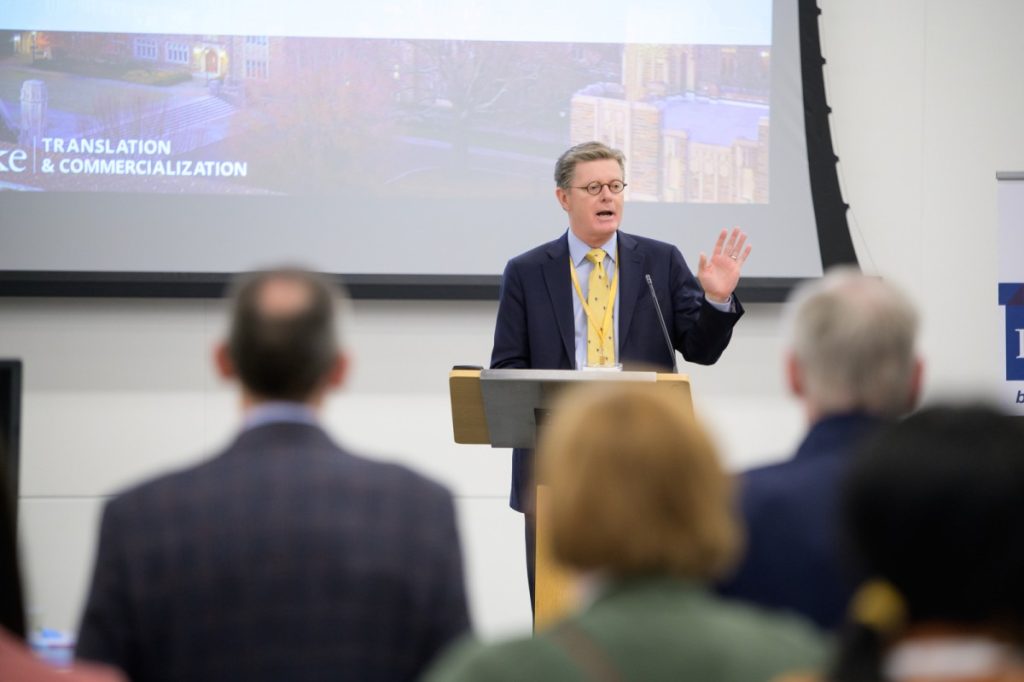

Beyond invention booths and speakers, resources for inventors were also featured at Invented at Duke, with 21 organizations, listed in more detail below, showing the different ways they can support innovators at Duke. From incubator spaces to translational funds, from helping startups to providing hands-on educational experiences for students, there was something for every kind of attendee.
As the evening wound down and attendees were filtering out into the chilly night, Duke inventors were given gifts of branded notebooks – all the better to keep writing down their ideas and jumpstarting new innovation journeys. Whatever the need, Duke’s Office for Translation & Commercialization stands ready to support these inventors along the way.
Invented at Duke 2023 was sponsored by:
Michael Best – Gold Sponsor
Hutchison, PLLC – Silver Sponsor
Wyrick Robbins– Silver Sponsor
Featured Inventors:
Patrick Bowen (Pratt School of Engineering)
Neurophos is developing metamaterial computer chips that work using photons instead of electrons for a more efficient and powerful approach to computationally intensive applications like AI. Bowen is a Ph.D. graduate from the Electrical and Computer Engineering Department lab of Professor David Smith.
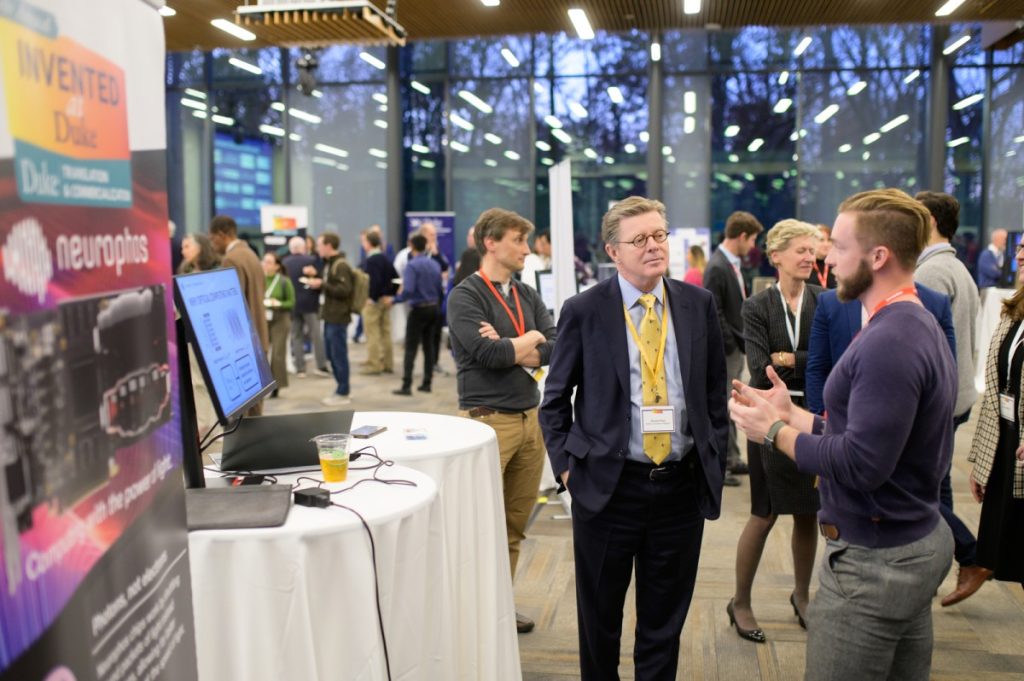
Joseph Fernandez-Moure (School of Medicine) & Jake Peloquin (Pratt School of Engineering)
Guided Medical Solutions is developing a trocar equipped with a camera and pressure sensor for safer, faster, and easier placement of chest tubes. Fernandez-Moure is an Assistant Professor of Surgery and Peloquin is a Ph.D. candidate in Mechanical Engineering & Materials Science.
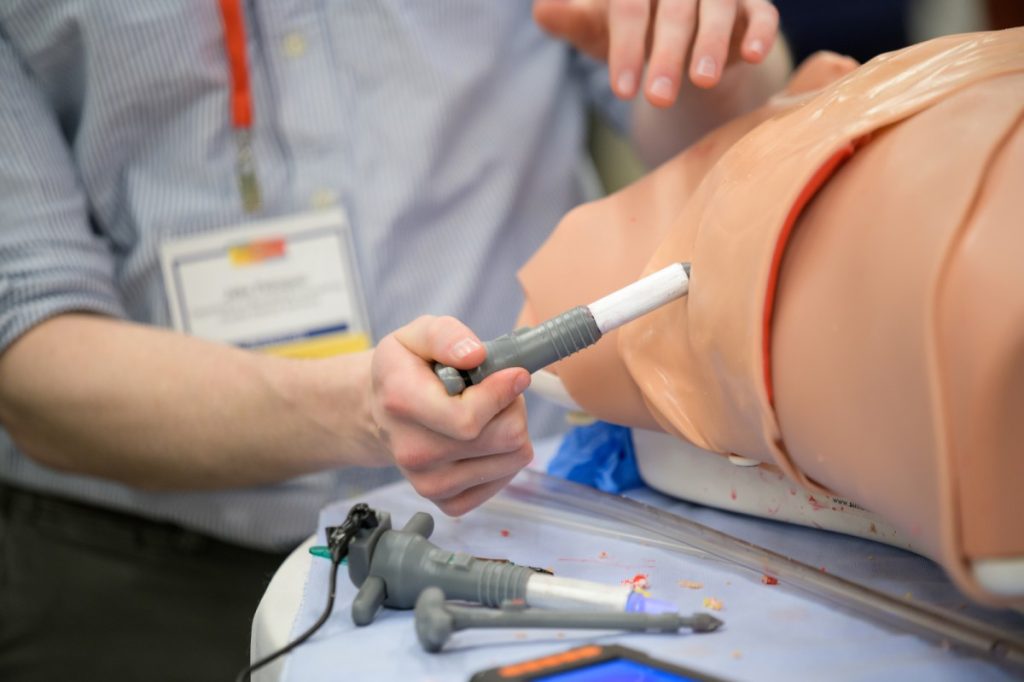
Dave Haas (Nicholas School of the Environment)
FaunaLabs is developing wearable sensors that work through fur for animal health applications. Haas is a Ph.D. graduate in Marine Science and Conservation.
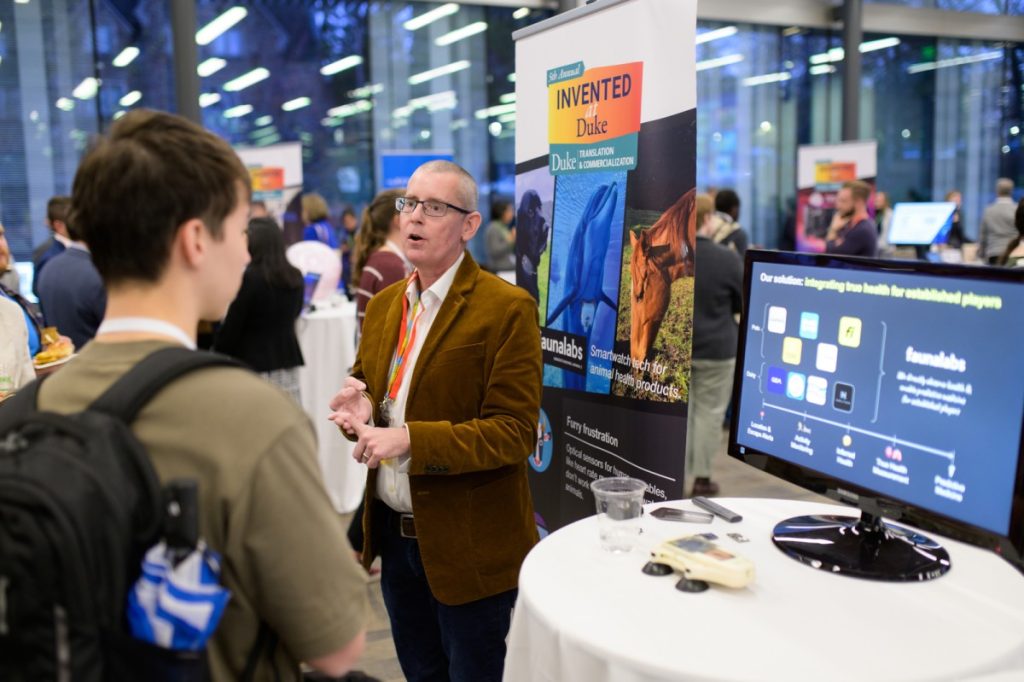
Aaron Kutnick (Trinity College of Arts & Sciences)
Spoolyard is an online filmmaking playground, a place to create, remix, and share moving image discoveries. Kutnick is an M.F.A. graduate in Experimental and Documentary Arts, has worked for the Center for Documentary Studies, and is currently with the Office of Information Technology.

Chase Moyle and Sonia Grego, Brian Stoner, and colleagues (Pratt School of Engineering)
Coprata is developing a smart toilet, which can analyze key digestive health indicators and provide AI personalized tracking, feedback, and support. Moyle is a Duke B.A. graduate, while Grego, Stoner, and colleagues run the Smart Toilet Lab at Duke’s WaSH-AID Center.
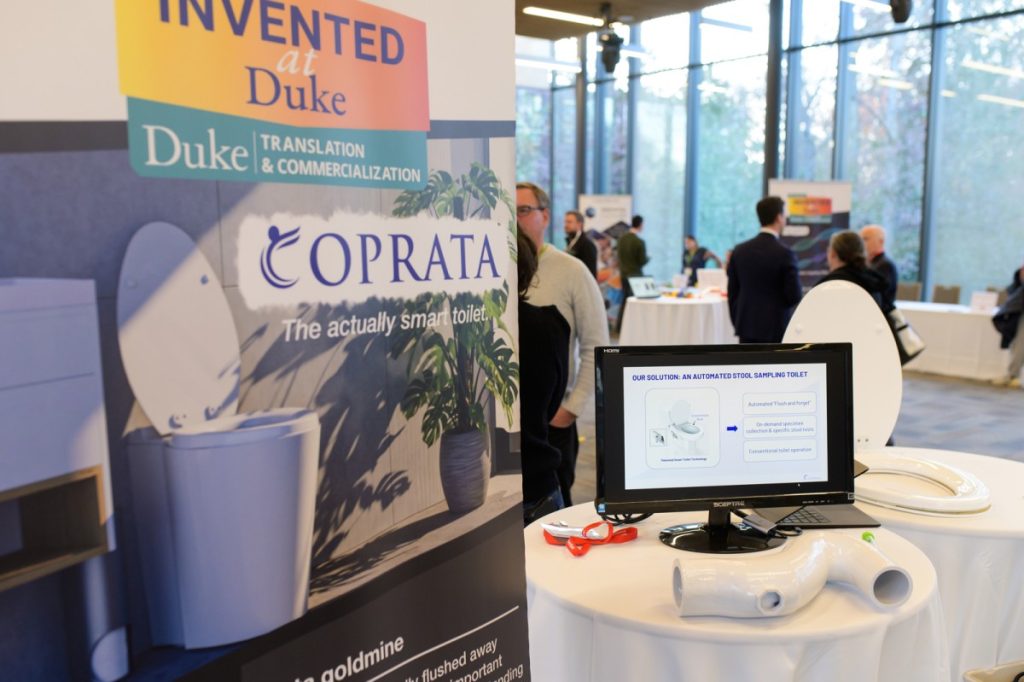
Steven Patierno and Jennifer Freedman (School of Medicine)
TheraSplice is developing precision medicine approaches targeting RNA splicing for oncology and other indications. Patierno and Freedman are both Professors of Medicine.
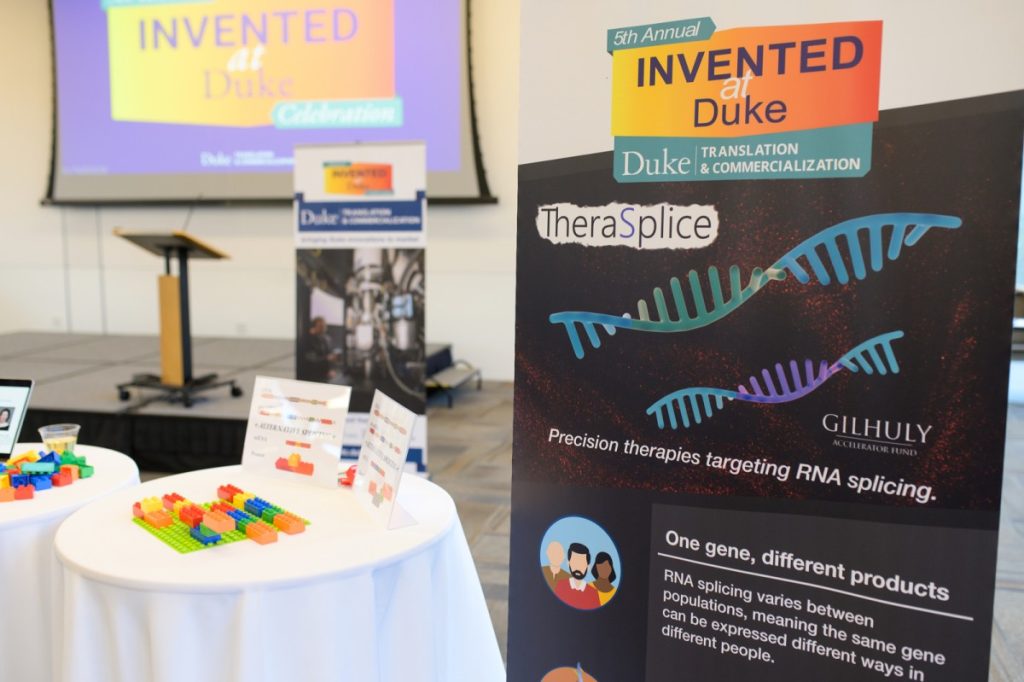
Michael Tadross and Victoria Goldenshtein (Pratt School of Engineering)
This team is developing GRIP Display, an all-in-one, plug-and-play system for protein library screening. It is based on a unique duo of molecules that glues a target protein to its own genetic material during translation. Tadross is an Assistant Professor of Biomedical Engineering and Goldenshtein is a postdoc in his lab.
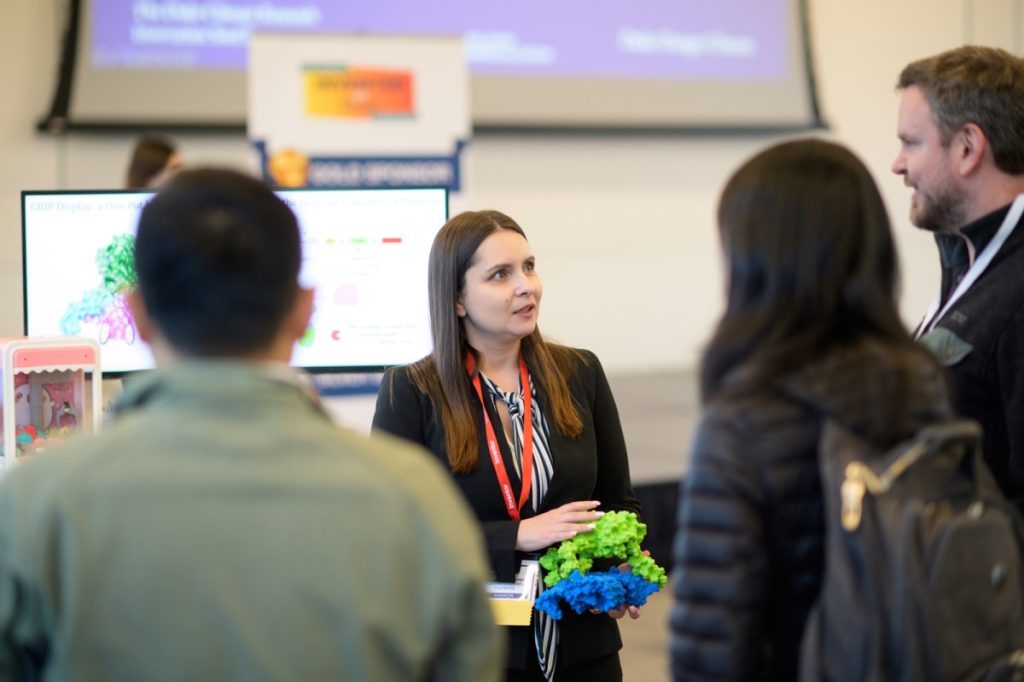
Stefan Roberts (Pratt School of Engineering)
inSoma Bio is developing injectable materials designed to mimic human tissue that can be used to rebuild tissue more safely and accurately, without the need for synthetic implants or fillers. Roberts is a Ph.D. graduate from the Department of Biomedical Engineering lab of Ashutosh Chilkoti.
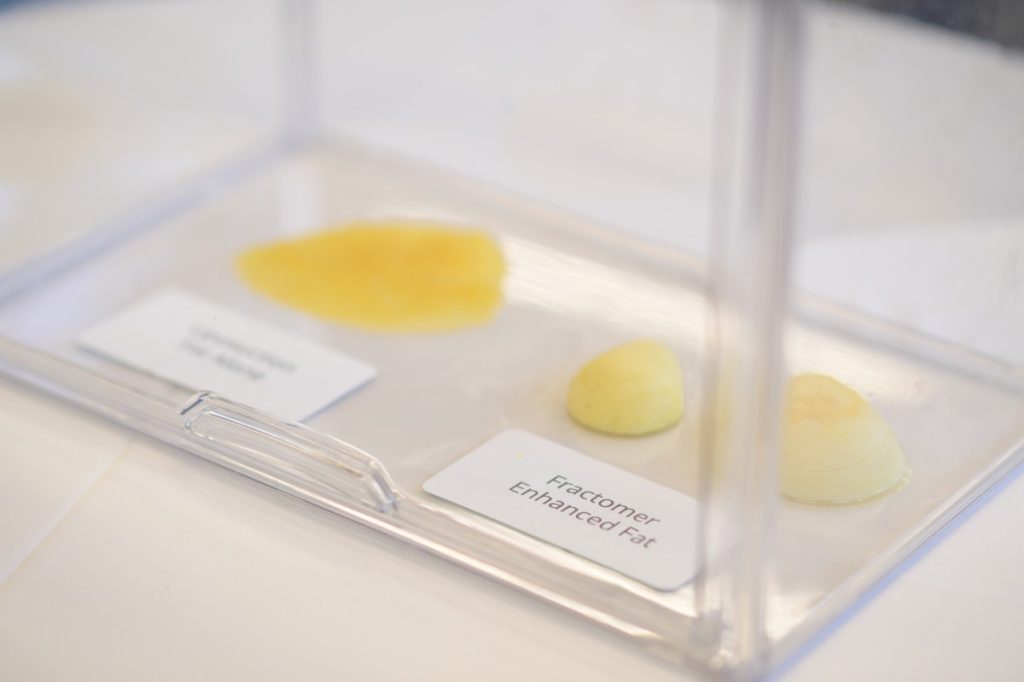
Joanne Wen (School of Medicine)
G1 Optics is developing a tonometer that automatically detects eye pressure using sensors and cameras, increasing repeatability and reducing subjectivity compared to the current gold standard. Wen is an Associate Professor of Ophthalmology.

Featured Resources:
Biolabs NC – a unique biotech co-working facility in downtown Durham, North Carolina.
Christensen Family Center for Innovation – advances technology innovation at Duke University and beyond through people, programs, and infrastructure.
CrossComm– builds custom software for innovative businesses looking to make an impact on their most important audiences.
Design Climate – two semester course that applies Design Thinking principles to address the most pressing climate challenges and develop innovations in sustainability.
Duke Capital Partners – leverage the power of the global Duke community to invest in and support entrepreneurs, to educate and empower students, and to engage and activate our members’ contributions to the University’s innovation ecosystem.
Duke Clinical and Translational Science Institute– the administrative home for the Duke Clinical and Translational Science Award (CTSA), overseeing and integrating sixteen CTSA core services into the fabric of translational science at Duke University.
The Duke Climate Research Innovation Seed Program – distributes grants to advance research aligned with the Duke Climate Commitment.
Duke Innovation & Entrepreneurship– provides interdisciplinary, experiential education and opportunities to innovators, supporting them in solving the world’s most pressing challenges.
Duke Institute for Health Innovation– catalyzes transformative innovations in health and health care through implementation of high-impact innovations, leadership development, and cultivation of a community of entrepreneurship.
Duke New Ventures– Duke’s startup starting point, turning your intellectual property into a startup company.
Duke Office for External Partnerships (OEP) – proactively engages with corporations and other potential external partners to understand their needs and match these to Duke assets by means of systematic outreach and internal scouting to identify and realize partnership opportunities originating with faculty, and to demonstrate value to Duke interests.
Four Points Innovation – a strategic partnership between Duke University and Deerfield Management focused on supporting and accelerating the translation of research into new therapies to treat and cure society’s most formidable healthcare challenges.
Innovation Co-Lab – a creativity incubator, focused on exploring how new and emerging technologies can fundamentally reshape the research, academic, and service missions of the university.
myRESEARCHnavigators – ensures that researchers are knowledgeable about relevant resources, collaborators, processes, and best practices for performing research at Duke.
North Carolina Biotechnology Center – create North Carolina’s competitive advantage in the life sciences, engaging partners, maximizing opportunities, and delivering solutions to accelerate innovation, investment, and job creation.
Nucleate – a free and collaborative student-led organization that facilitates the formation of pioneering life sciences companies.
OTC Fellows Program – an exciting opportunity for Duke graduate students and post-doctoral fellows to gain exposure to the process of commercialization of academic science.
Pattern Health – partner with researchers, clinical innovators, and their institutions to develop and implement digital health programs, surveys, and clinical tools.